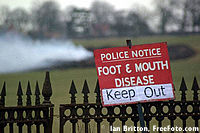Foot and mouth: We must slaughter to save, say scientists
Writing in the journal 'Science', researchers at London's Imperial college of science, technology and medicine endorse the rapid, pre-emptive slaughtering of livestock that may be infected with foot and mouth disease (FMD) as the best way to slow the epidemic. The researchers, whose work is based on data provided by the British Ministry of agriculture fisheries and food , recommend 'ring-culling' of animals on farms bordering infections sites to reduce the spread of the disease beyond the 45,000 farms within areas currently classified as affected. 'If it isn't stopped, FMD will ultimately threaten farms throughout Great Britain,' they say. 'Extensive culling is sadly the only option for controlling the current British epidemic, and it is essential that the control measures now in place are maintained during the long decay phase of the epidemic (several months) to ensure eradication.' Using mathematical models to predict the way the disease might spread, the team found: - the faster animals are slaughtered following the report of suspected infection, the bigger the reduction of the epidemic; - even when infected animals are slaughtered within a day of showing symptoms of FMD, 'some 30 per cent of all UK farms will be affected in the following months; - a more aggressive approach of slaughtering infected animals within 24 hours of symptoms appearing, followed by ring-culling over a 1.5km area within 48 hours would protect more farms; - vaccinating surviving animals within a 3km radius of an infection site further reduces the number of farms affected by the epidemic. The FMD epidemic is yet to appear under control in Europe with a fresh outbreak confirmed in the province of Friesland in the Netherlands this week. The European Commission has adopted protective measures in addition to preventing the dispatch of species of live animals which are susceptible to FMD from anywhere in the Netherlands. In addition, the consignment of fresh meat and meat products, milk and milk products and other animal products from these species from the Netherlands is prohibited, 'unless treated appropriately.' Vehicles used for the transport of livestock and milk must also be disinfected. 'Everybody concerned from farmers to the Member States' public authorities must remain vigilant and rigorously implement Community legislation and best veterinary practice,' commented the European Commissioner for health and consumer protection David Byrne. 'Everybody must rally around the Community's policy of effectively stamping out this disease.'

